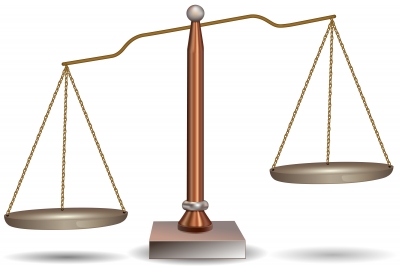In many languages around the world (English, Russian, Spanish, Latvian, Chinese, Dutch, etc.), weight is associated with importance, influence and emphasis. For example, in English we might say such things as (1) “the manager has some weighty decisions to make” or (2) “get the president to sign because his signature carries more weight” or (3) “you need more facts in order to add greater weight to your argument.” But does the link between weight and importance only exist in the realm of linguistics? Research published in 2009 by Nils B. Jostmann, Daniel Lakens and Thomas W. Schubert suggests otherwise.
From our earliest childhood experiences, we begin to associate weight with profound events or consequences (Jostmann et al., 2009). We quickly learn that there is a great difference between being hit with a light object versus being hit with something heavy. We learn that the energetic cost of moving a heavy object is much higher than that of moving a significantly lighter alternative. And soon enough, we also learn that weighty objects can severely tax our mental faculties. Moving a piano takes quite a bit more planning than moving a pen; catching a paper ball might become almost a reflex, but catching a bowling ball requires absolute focus. [showmyads]
Weight can drastically affect our perception of the world. Research has shown that individuals with heavy backpacks perceive distances to be greater and hills to be steeper than individuals without backpacks (Proffitt, 2006, cited in Jostmann et al., 2009). Theories of embodied cognition posit that “cognitive representations are grounded in the brain’s sensorimotor systems” (Jostmann et al., 2009). By associating bodily experiences (such as carrying a heavy backpack) with abstract concepts, we can develop mental frameworks (schemas) that connect these events to each other. Therefore, when a particular experience is “activated” it can cause mental stimulation and actually influence abstract thought (Boroditsky & Ramscar, 2002, cited in Jostmann et al., 2009). “An intriguing possibility is that the abstract concept of importance is still grounded in sensory experiences of weight” (Jostmann et al., 2009).
Across four fascinating studies, Jostmann et al. (2009) examined people’s reactions to holding a heavy clipboard versus holding a light clipboard. Participants with the heavy clipboard: (1) estimated foreign currencies to be more valuable (2) thought having a voice in decision-making procedures to be more important (3) had more cognitive elaboration, and (4) had greater confidence in their own opinion regarding certain issues raised during the experiment.
The results “consistently demonstrated the embodied relationship between weight and importance across different domains, such as money, procedural justice, and community policy” (Jostmann et al., 2009). Were the results influenced by some participants simply being annoyed that they were asked to hold a heavy clipboard? Jostmann et al. (2009) report:
Notably, we found no evidence that participants perceived holding the heavy clipboard as more effortful than holding the light clipboard. Indeed, the weight of the heavy clipboard did not affect participants’ mood, and it did not make participants perceive the task as more difficult or less pleasant. It thus seems unlikely that participants who held a heavy clipboard misattributed conscious feelings of effort when judging importance, or took such feelings as cues to engage in greater cognitive elaboration. (p.1173)
So, what does this study on weight mean for humankind? Well, in addition to making us feel a lot better about ordering seconds, it takes us one step closer to an answer for the age old question…”Does size really matter?” The jury is still out on the size issue, but it’s pretty clear that weight definitely packs a wallop.
Reference
Jostmann, N. B., Lakens, D. & Schubert, T. W. (2009). Weight as an embodiment of importance. Psychological Science, 20(9), 1169-1174. Retrieved on May 15, 2012 from http://www.igroup.org/schubert/papers/jostmann_psci_2009.pdf
Photo courtesy of Image(s): FreeDigitalPhotos.net
Related articles
- Touch influences social judgements and decisions (neurophilosophy.wordpress.com)
- You’re Far Less In Control Of Your Brain Than You Think, Study Finds (medicalnewstoday.com)
- When your eyes tell your hands what to think: You’re far less in control of your brain than you think (sciencedaily.com)



